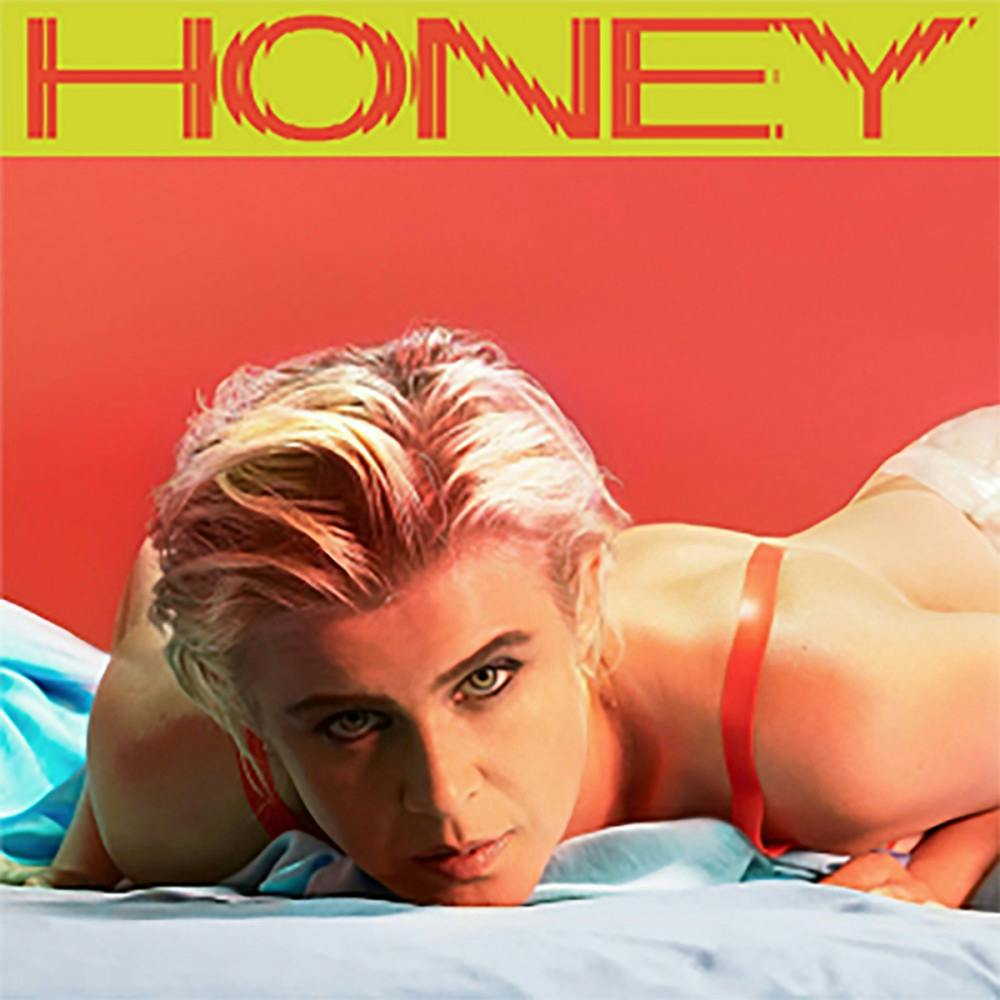It’s been eight years since Robyn released her last studio album, 2010’s “Body Talk.” The intervening period witnessed the profligacy of Miley Cyrus, the genre-hopping of Taylor Swift, the ascendance of The Weeknd and the global dominance of Adele. Ariana Grande, then a Nickelodeon star, is now a tabloid fixture; Lady Gaga, then an insurgent pop star, is now an Academy Award contender. The void Robyn left — sophisticated synth-pop — was never filled, although Gaga’s failed “ARTPOP” and Lorde’s underestimated “Melodrama” tried.
On “Honey,” Robyn evolves the sound that spawned her global resurgence. The album has fewer moving parts than “Body Talk” — less percussion and more exposed vocals. It’s not raw — if anything, it’s more deliberate than its predecessor — but Robyn, who co-wrote every song on the album, adopts more minimalist arrangements here than in her past work. On “Honey,” she doesn’t need a wall of sound — the album is too introspective.
With less instrumental backing, Robyn’s vocals feel more personal, removing a barrier between artist and listener. Robyn delayed the album following the death of a longtime collaborator, producer Christian Falk, and a breakup with her longtime boyfriend, director Max Vitali. Since her last album, she’s also started therapy. Always precocious — at 19, she released two songs on abortion — Robyn here waxes philosophical about life and death.
In the lineage of musicians who process grief, there are two broad paradigms — specific and universal. Mount Eerie’s 2017 album, “A Crow Looked at Me,” belongs to the former category, addressing the death of his wife with such intimate lyrics as, “I finally took out the upstairs bathroom garbage that was sitting / there forgotten since you were here.” Post-hardcore band Touché Amoré adopts similar specificity in their 2016 album, “Stage Four” — “I was told you were half asleep / Told myself you would be proud of me.” Following the same pattern, in the album “Tonight’s the Night,” Neil Young sings, “It sent a chill up and down my spine / When I picked up the telephone / And heard that he’d died out on the mainline.” These paradigmatic albums employ explicit autobiography to poignantly depict loss. Their effect is cumulative, gathering small anecdotes that together form an arc of mourning.
Still other artists eschew strict autobiography to universalize their grief — AC/DC’s “Back in Black” addresses the death of vocalist Bon Scott only thematically, and Ariana Grande’s “Sweetener” processes the Manchester bombing with generalized positivity. Earlier in October, pianist Igor Levit charted the same path on “Life,” which transcends the particular grief that inspired it for a collection of profound pieces on the human condition. This is the approach of Robyn on “Honey” — the singer sands down the edges of autobiography to make broad anthems about life and loss. Like Grande on “Sweetener” and her own earlier work on “Dancing on My Own,” Robyn encodes tragedy in deceptively upbeat pop.
The only direct commentary on grief in “Honey” is “Missing U,” the lead single, which connects Robyn’s mourning of Falk to her breakup with Vitali. The titular “U” is unspecific; some of the lyrics seem to apply to Falk, others to Vitali. It’s a song about physical as much as emotional absence — or, in the words of Robyn, “the psychedelic, trippy thing that happens when people are not there anymore.” As the lyrics say, “There’s this empty space you left behind / Now you’re not here with me.” With the backing of acrobatic synths, Robyn recounts the loneliness of heartbreak. It’s a natural evolution for an artist who once insisted that “Fembots have feelings too.”
This is Robyn’s most personal album — she even reveals the seams of autobiography on “Send to Robin Immediately,” dropping her stage name for a meditation on urgency. Most of the lyrical content on “Honey” resembles that of “Body Talk,” exploring romance and disaffection. Yet this album has a clearer arc than its predecessor, which compiled two earlier “Body Talk” volumes. The first several tracks on “Honey” are its most melancholic — “Missing U” opens the album, followed by “Human Being,” where “emotions are out of date,” and “Because It’s in the Music,” where “[n]othing lasts forever.” “Baby Forgive Me” is a gesture of reconciliation that fades into “Send to Robin Immediately” to request a response. The best moment of “Honey” is the ethereal title track, which premiered on the final season of HBO’s “Girls.” The song makes a defiant pitch: “No, you’re not gonna get what you need / But baby, I have what you want / Come get your honey.”
The album is a narrative of growth after grief and a commanding evolution from a seminal singer-songwriter. If Robyn is sincere on the album’s final track, “Ever Again,” it’s also a farewell to her brand of melancholic pop — “I’m only gonna sing about love / Ever again.”
Correction: This article previously misstated the title of the song “Missing U” as “Missing You.” The article has been updated with the correct spelling.







